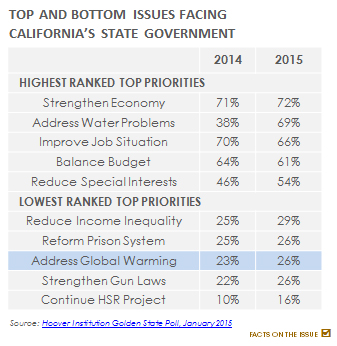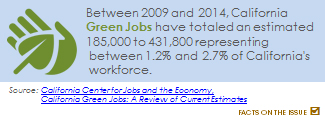- State & Local
- California
Aiming to fulfill Governor Brown’s State of the State proposals, Senate President Pro Tem, Kevin de León, introduced a portfolio of climate change legislation in early February. Unlike Brown, however, who spent 23 percent of his address proposing the climate change agenda and defending further action on moral grounds, de León framed his actions as a way to “make sure California keeps leading in building the new economy of tomorrow.” While legislative Democrats have historically used environmental moralism to argue in favor of combating global warming, de León’s seemingly whip-lash-like messaging is all about politics.
According to the January 2015 Golden State Poll, just 26 percent of likely California voters named dealing with global warming as their top policy priority for Sacramento to focus on in 2015. The only issue to do worse is Governor Brown’s other legacy-building ploy: the high-speed rail project (at 16 percent).
Even key Democratic voter groups don’t consider the issue a top priority. Millennials rank it 11th (out of 21 items); Latinos put combating climate change at 18th, while likely female voters consider it the 19th ranked top priority. And low-income families only rank high-speed rail below combating climate change. With Republicans immediately skeptical of more big government action and well-financed interest groups ready to put the brakes on more environmental mandates, legislative Democrats can’t rely on voters’ support for an aggressive climate change agenda.
As such, de León is turning the climate change battle into a panacea for sluggish economic growth and job creation, areas which 72 percent and 66 percent of likely voters consider top priorities for Sacramento (1st and 3rd, respectively). More importantly, across every single demographic category, at least one of these issues are in the top 5 top priorities – Independent likely voters being the only subset not to rank both among the top 5 issues.
In a way, Democrats are victims of their own success. With Sacramento effectively under one-party (Democratic) rule, Democrats receive the credit for all the good and bad that happens in California. If the caucus is seen as pushing climate change actions at the expense of the economy, there could be voter backlash in 2016. True, the next cycle will be a Presidential election year, which should help Democrats in terms of voter turnout, but Democrats won’t find state Republicans sleeping at the wheel like they did in 2012.
Assembly Democrats will clearly target Republicans David Hadley (AD 66) and Catharine Baker (AD 16), who hold, respectively, D+3 Los Angeles suburban and D+8 San Francisco Bay Area suburban seats. Both won in 2014 thanks to contrasting their pragmatic, pro-growth, pro-common sense agenda against unaccountable Democratic one-party rule. State Democrats pushing climate change over economic growth would only bolster their re-elections. Democrats could also target AD 60 (R+0.3) and AD 35 (R+3), but a heavy environmental Sacramento agenda isn’t necessarily a winner in a seat that the Republican Eric Linder (AD 60) first won in 2012 despite President Obama also carrying it or a district (AD 35) that the President didn’t even win. Moreover, Assembly Republicans likely plan to retake AD 44. This swingy Ventura County seat prefers moderates to ideologues, putting incumbent Democrat Jacqui Irwin in a political bind if her caucus pushes aggressive environmental actions.
In the Senate, Democrats realistically have no pick-up opportunities among the up-for-election odd-numbered districts. But Republicans will likely target SD 5 (D+2) and SD 27 (D+4). Democrat Cathleen Galgiani won SD 5, a North San Joaquin Valley district, by just 1 point in 2012, even as President Obama was easily winning the district. Sacramento’s progressive environmental agenda is a difficult sell in the Central Valley. Meanwhile, in 2012, Democrat Fran Pavley – who is termed-out in 2016 – managed to hold onto SD 27 by only 7 points. During the 2012 campaign, Pavley – the principal author of California’s landmark environmental law, AB 32 – was forced to tone down her environmentalist positions, suggesting the district might be wary of supporting further aggressive climate change actions.
Given the current electoral reality in California, Democrats have to stumble for Republicans to make strong advances. It is clear that de León, and likely many other Democrats, realize the political perils of aggressively pushing climate change action as the expense of economic growth. The only remaining question (and one that won’t be answered until November 8, 2016) is whether Democrats succeed is re-framing the environmental agenda into an economic one.

SENATE DISTRICT 27 CAMPAIGN
The campaign pitted incumbent Senator Fran Pavley against Los Angeles County deputy district attorney Todd Zink in the redistricted and “moderate” Senate District 27. Both Zink and Pavley focused their campaigns on education, the budget/business climate, and public safety; however, when questioned about her vocal environmental stances, Pavley focused her response on green job creation, claiming in one advertisement that her environmental legislation helped create over 30,000 new jobs. Zink won the June Primary with 51%, but Pavley prevailed in the November General Election with 54%.


















